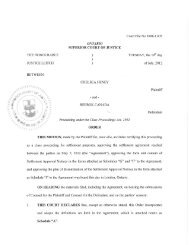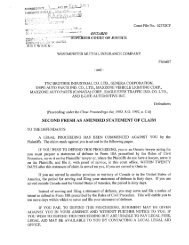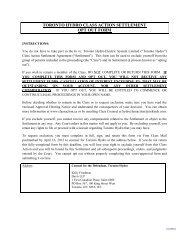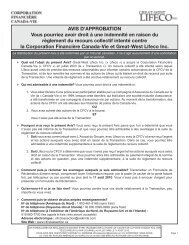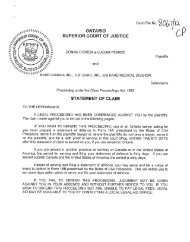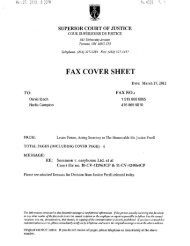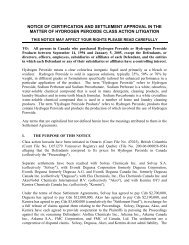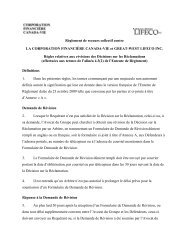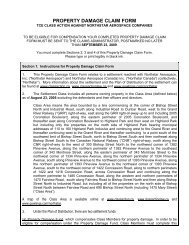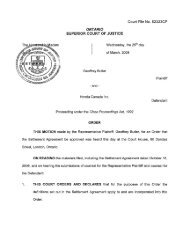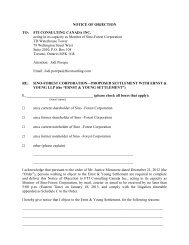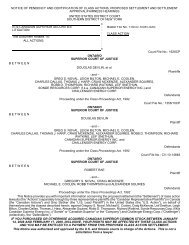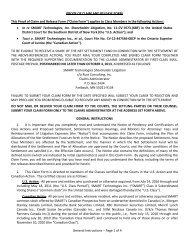Gariepy v. Shell Oil Co. - Classaction.ca
Gariepy v. Shell Oil Co. - Classaction.ca
Gariepy v. Shell Oil Co. - Classaction.ca
You also want an ePaper? Increase the reach of your titles
YUMPU automatically turns print PDFs into web optimized ePapers that Google loves.
20 The defendants take a different view of these numbers. They point to the fact that only 311claimants have contacted the plaintiffs' counsel and only 100 of those had actually experienced aleak. More telling, the defendants say, is the fact that of the 13 homes that the plaintiffs themselvespicked to have their litigation inspector attend and review in 1999, only two had experienced anyleaks at all. Further, only three of the plaintiffs' four residences have experienced leaks. Thedefendants therefore submit that the class size is likely to be much smaller than the plaintiffs wouldportray it to be. 21 The defendants say that what is of more importance to the issues on this motion is the fact thatthere are many different kinds of leaks, and equally many different reasons for leaks to occur, in PBplumbing systems. The defendants assert that determining the lo<strong>ca</strong>tion of a leak, and the identity ofthe leaking plumbing component, is a prerequisite for assessing any of the defendant's liability toany plaintiff be<strong>ca</strong>use each of the defendants supplied resin that was manufactured into entirelydifferent plumbing components. Further, they point to the fact that there are many other plumbingcomponents that are not derived from the defendants' resins at all and, if a leak occurs in thosecomponents, it is not disputed that these defendants would not be responsible for it. 22 The defendants also point to the experience of the Plumbing Claims Group, Inc., a non-profitcorporation owned by <strong>Shell</strong>, Celanese and Du Pont and established to provide a voluntary claimshandling program for home owners who have experienced certain kinds of leaks in plumbingsystems containing PB pipe with acetal and/or metal insert fittings. There were 193 claims made by179 Canadian claimants to this group. An examination of those claims, which were alleged toinvolve leaks in the claimants' PB plumbing systems, demonstrated that the leaks actually occurredin a variety of components - for example PB pipe, acetal insert fittings, acetal insert joints, metalinsert joints, plastic valves, toilet risers, faucets, acetal compression fittings, ABS drain lines anda shower valve. The defendants rely on this evidence in support of their contention that the sourceof any given leak <strong>ca</strong>n be both difficult to discover, thereby requiring an examination of the specificsystem, and <strong>ca</strong>n be totally unrelated to any product manufactured from the defendants' resins.Similarly, the defendants say that the mere fact that a leak occurs in a product manufactured fromthe defendants' resins does not establish liability on the defendants be<strong>ca</strong>use the leak may occur fora variety of reasons. Again, the defendants say that only an examination of the specific system willanswer the question whether the leak is related to a problem that is ultimately the result of the useof the defendants' resins. 23 Lastly, the defendants say that even the experts on the plaintiffs' side admit that not all PBplumbing systems will fail nor is it possible to predict if and when any given PB plumbing systemwill fail. 24 There are additional compli<strong>ca</strong>tions regarding the acetal insert fittings. As I earlier mentioned,such fittings were made from Delrin and from Celcon. Celanese says that while Celcon and Delrinare both acetals, there are signifi<strong>ca</strong>nt differences in their properties, including their chemi<strong>ca</strong>lresistance. Celcon and Delrin were often used interchangeably by component part manufacturers,such that fittings made from each of those materials are frequently found in the same mobile andsite-built homes. In addition, Du Pont supplied Delrin to Bow Plastics, Ltd., the primarymanufacturer of polybutylene plumbing in Canada. Celanese did not sell or supply Celcon to Bow.Celanese therefore contends that, not only is it unlikely that its product was used in any acetal insertfitting that might be found in a Canadian installation, the fact that a leak is found in such a fitting



